October 7: The Return of History
During one of many recent somber moments, with soldiers dying as Israel remained mired (if not eyeless) in Gaza, more than one hundred hostages still in captivity, almost one hundred thousand internal refugees from the north unable to return to their homes because the IDF could not keep them safe, and the country still deeply traumatized by the horrors perpetrated by Hamas on October 7, 2023, with the inescapable brutality of the ensuing war, I texted a friend: “This wasn’t in the aliyah handbook ” He replied instantly. “No, it wasn’t in the aliyah handbook, but it was in all the history books.”
I stared dumbly at the text. He was right. So obviously, indisputably right. Amid fear for my country and my family, why had I taken no comfort in the fact that though this horrible period was new to today’s Israel, it wasn’t entirely new to the Jewish people?
It will take years for historians and others to decipher this war. How was Israel caught so unprepared by Hamas? Did internal divisions over judicial reform invite the attack? Most importantly, will what we are experiencing be seen in the future as a terrible period that eventually subsided? Or is it, perhaps, the beginning of a decline from which the Jewish state will never recover—as has happened twice before in our people’s history?
Similarly, historians will discuss for decades what happened to tolerant American liberalism. What was it that suddenly made a soft antisemitism (barely camouflaged as anti-Zionism) not only acceptable but, in certain circles, entirely legitimate and even de rigueur? Will we say that the period we are now living through was a terrible time for American Jewry from which it ultimately emerged? Or will we eventually look back on this year as the beginning of the end of American Judaism’s golden era?
Those questions are impossible to answer now. But there is another looming question that we can already begin to address. If we knew anything at all about Jewish history, why were we so surprised?
The question applies to Israelis as well as to American Jews, but let us begin with Israel: Given that Israel is a society saturated with the memory of horrors perpetrated on Jews, why were the atrocities of October 7 so unimaginable? Israelis have long been taught a somewhat exaggerated and monochromatic history of Jewish Europe as a valley of tears: incessant pogroms, with Jews attacked by mobs, children murdered in front of their parents, women raped and maimed, young and old hiding in closets for hours, praying that the marauding mob would not find them. As horrifying as the “Black Sabbath” was, Jews had been there before, and not all that long ago.
And given that Israel has always been surrounded by enemies sworn to its destruction and has not had a decisive military victory in more than a generation—the Lebanon war was a two-decade quagmire; our previous confrontations with Hamas all ended in bloody draws—how is it that Israeli society was so fundamentally shocked by the military and intelligence failures of October 7?
Though all Israelis are taught that after the Six-Day War, Israel fell into a triumphalist stupor, underwritten by a strategic konseptzia (concept, or, perhaps more precisely, widely accepted yet false certainty)that led to the debacle of the Yom Kippur War, we nonetheless allowed ourselves to fall prey to a different kind of dangerous triumphalism. Our overweening confidence this time stemmed as much from being a start-up nation, with its concomitant overreliance on technology, as it did from purely strategic misconceptions, though we had those too. We believed that Hamas could be militarily contained and bought off by money from Qatar and that signing the Abraham Accords with Sunni nations would change everything. So why were we surprised to find that we had fallen prey to conceptual hubris again, just as we marked the fiftieth anniversary of the Yom Kippur War?
In the days after October 7, beyond their horror at the savagery of the Hamas massacre, their incredulity at the human capacity for evil, and their fury over the government’s ineptitude, Israelis were shocked that their fellow citizens could be, at least on that Black Sabbath, defenseless victims of something that could be fairly called a pogrom. They were surprised to find themselves back in Jewish history. Why?
Across the ocean, Jews were no less dumbstruck when a wave of antisemitism swept across America. Jonathan Greenblatt, CEO and national director of the Anti-Defamation League, acknowledged, “The alarming rise in antisemitic attacks has caught many of us off guard.” Eric Fingerhut, president and CEO of The Jewish Federations of North America, said, “The recent wave of antisemitic incidents has left many in our community stunned.”
Part of the surprise was that the hatred came from the progressive left rather than the ultranationalist right. Liberal Jews, which is to say most American Jews, had been shocked but not entirely surprised by the resurgence of 1930s-style populist antisemitism from the Charlottesville march (“Jews will not replace us!”) to the Tree of Life murders and later attacks. But the hatred expressed by protesters on elite college campuses (“There is only one solution, intifada, revolution!” “Glory to our martyrs”—that is, murderers and rapists) and—perhaps even more—the diffidence, or even encouragement, of their administrators and professors, genuinely stunned them. Should it have?
A virulent anti-Zionism that drew on old tropes of antisemitism goes back to the origins of the New Left and had been percolating on campuses and in radical precincts for years. As Rep. Ilhan Omar (who could have been quoting Father Coughlin) said in 2019, “It’s all about the Benjamins, baby.” Some radical student and faculty groups at Harvard even dredged up an ancient bit of anti-Zionist agitprop from 1967, which in turn drew on classic antisemitic iconography: a white hand tattooed with a Jewish star and a dollar sign holding the ropes of black figures in nooses. The acquiescence of university administrators to the glorification of violence and the intimidation of Jewish students may have been a bit surprising, especially if you hadn’t spent much time on a campus in the last decade, but it’s worth remembering that many of these institutions enforced Jewish quotas within living memory. When a Columbia dean texted a vomit emoji to her colleagues as rabbis and Jewish students spoke of their experience, she partook in a venerable tradition of elite disdain for Judaism, albeit with less subtlety than her predecessors.
So, again, why were we—Israeli and American Jews—so surprised? How could a people virtually addicted to telling its history be flabbergasted when that history returned? I believe the answer lies in the story that each of these two communities told about itself.
The two greatest Jewish communities in the world, which between them constitute almost 90 percent of the world’s Jews, had made fundamentally flawed assumptions about the Jewish future because they had chosen uniquely flawed ways of reading their relationship to their past. To be brief: Zionism believed that it could change Jewish history, while American Judaism thought it could escape Jewish history. They were both wrong.
Haim Hazaz published his now classic short story, “The Sermon,” in British Mandatory Palestine in 1942—when Jewish history was darker than ever. Across Europe, Jews were being slaughtered, the United States had essentially closed its borders to them, and the British had sealed the shores of Palestine. When the usually reticent character Yudka spoke at a kibbutz meeting, he told his comrades:
I don’t respect Jewish history. I am opposed to it . . . we never made our own history, the Gentiles always made it for us.
Jewish history is simply boring. . . . It has no adventures, no conquering heroes, no great rulers or potentates. All it has is a mob of beaten, groaning, weeping, begging Jews. . . . If it were up to me, I wouldn’t allow our children to be taught Jewish history at all. Why on earth should we teach them about the shameful life led by their ancestors? I would simply say to them: “Look, boys and girls, we don’t have any history. We haven’t had one since the day we were driven into exile. Class dismissed. You can go outside now and play.”
History was something that happened to Jews, not something they made.
With hindsight, of course, Yukda’s read of Jewish history was simplistic. Two decades before Hazaz wrote “The Sermon,” the historian Salo Baron had already insisted that what he called a “lachrymose conception of Jewish history,” a story that could be told only through tears, was simplistic to the point of falsehood. After all, half a century separated the First and Second Crusades, and most of Russian Jewry slept safely in their beds on the nights that Kishinev burned. Jews worked, played, and interacted peacefully with their neighbors throughout Jewish history. Baron was right, but in 1942, the notion that Jewish history was a continuous valley of tears seemed a fair description, and, in truth, Baron may have underestimated the tears of exile. The purpose of Zionism—of which kibbutzim like Yudka’s were mission control—was to rewrite that history, or at least its narrative arc. Zionism wasn’t about denying Jewish history—it was about altering it.
If Yudka is the literary expression of the Zionist grand narrative in which Israel relegates Jewish victimhood to the past, his architectural counterpart can be found at Yad Vashem, the official Israeli Holocaust memorial museum. At Yad Vashem, one walks into dim light, and unfinished concrete walls lean in toward the ceiling. The world closes in, leaving the visitor trapped in darkness, in a world in which there is no sky, no hope. The exhibit meanders, and the visitor loses any sense of orientation—an intentional metaphor for Jewish history before the (re)creation of the Jewish state.
The exhibit terminates, unforgettably, at a giant terrace. After the prolonged period of darkness, the sunlight is almost blinding. Instead of the walls closing in above us, we stand in front of a huge expanse of the Jerusalem Forest and boundless sky. This is the architectural representation of Judaism’s ancient prayer that God deliver us “from distress to relief, from darkness to light, from servitude to redemption.” Yudka was right, but now we can learn Jewish history—because we have altered its trajectory, it is no longer only a story “of beaten, groaning, weeping, begging Jews.”
Situated in the very forest that is home to Yad Vashem’s darkness lies Mount Herzl, Israel’s national military cemetery. As is true of many military cemeteries across the world, the wording on these gravestones is strictly prescribed. In Israel, the mandated formulation provides all the information that Zionism believed matters: the soldier’s name, his parents’ names, where he was born, the year he made aliyah (if he did), the fact that he died “while fulfilling his mission,” the Hebrew date of his passing, and his age at the time of his death. Why the date of aliyah? In halakhic literature, conversion to Judaism is a kind of rebirth. In Zionism’s view, aliyah is also a rebirth—into a fundamentally changed Jewish world.
Nothing is more evocative of the Zionist determination to alter the course of history than the nation’s symbol. Hundreds of ideas for Israel’s national symbol were proposed in 1948, but the one that was ultimately chosen was the menorah. And the artistic rendering that won the government-sponsored contest is a replica of the ancient menorah carried by the Roman conquerors depicted on the Arch of Titus, which celebrated the destruction of Jerusalem and the pillaging of the Temple. When Great Britain presented the young state with a sculpted menorah on Israel’s eighth Independence Day, it was placed outside the Knesset building, the governmental “temple” of the re-created third commonwealth.
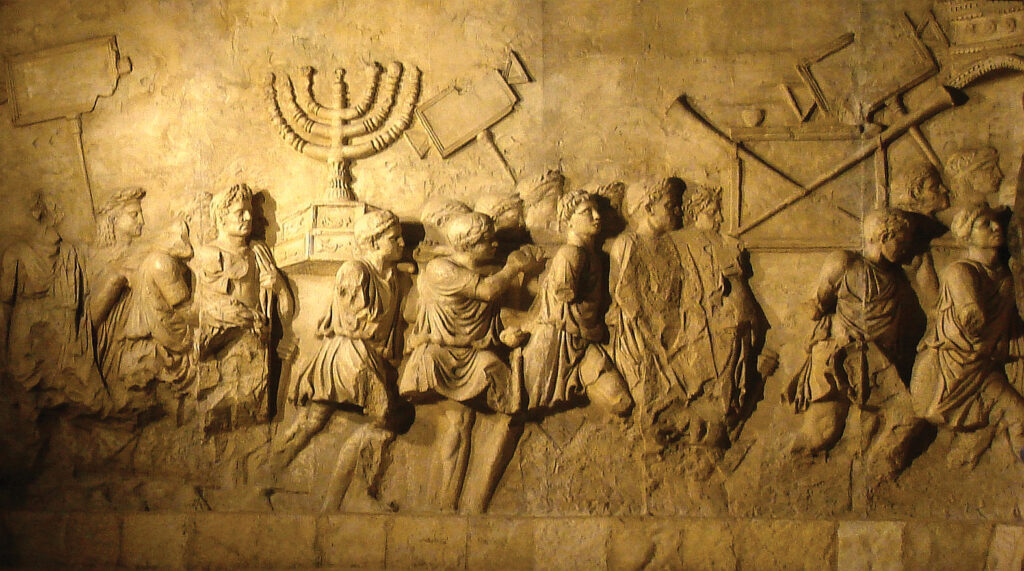

My grandmother fled Ukraine and arrived in the United States in 1908 at age eleven. Or in 1911 at age eight. No one in the family is certain. We could probably look it up, but to my knowledge no one has. Our failure to do so is in many ways an echo of her silence about the world she left behind. Though I was already a father when she died, not once did I hear her say a word about her life before Ellis Island.
American Jews did not imagine that they could change Jewish history; they thought they could dodge it. As Saul Bellow put it in Humboldt’s Gift, Humboldt—a midcentury American poet who was the son of a Jewish Hungarian immigrant father—believed that “history was a nightmare during which he was trying to get a good night’s rest.”
America’s ethos virtually required Jews to leave their history at the dock. This dulling of historical sensibility, of course, was not accidental. Many American Jewish leaders believed—perhaps wisely—that it was the price of acceptance to America, which incidentally saw itself as a “new Zion.” The title of Will Herberg’s 1955 classic, Protestant-Catholic-Jew: An Essay in American Religious Sociology, captured perfectly how American Jews wished to be seen in the decades after the war: as Americans whose religious identity was part of their essential Americanness.
Here is how Philadelphia’s Weitzman National Museum of American Jewish History website characterizes the initial story of its permanent exhibit Dreams of Freedom:
[It] chronicles how millions of Jewish immigrants came to the United States around the turn of the 20th century, drawn by the hope for better lives for themselves and their children—sustained by economic opportunity and political and religious freedom. This exhibit continues with American life after Congress legislated the end of free and open immigration in 1924 through the lenses of the performing arts, political activism, and religious expression. It concludes with World War II.
We hear what Jews who came to America were seeking but very little about what it was that they were fleeing. My grandmother was not the exception; she was the rule. America was an escape from history.
The last year has forced both Israeli and American Jews to begin to confront the inadequacy of their respective narratives. History came calling for all of us.
When a European pogrom crossed the border on October 7, Israelis found themselves horribly unprepared, not only militarily but intellectually and emotionally. American Jews were no less shell-shocked when they were confronted with a mix of outright hatred, sophistic justification for the murder and torture of Jews, and plain indifference—all painfully reminiscent of centuries of Jewish history.
Israelis have not given up. Our sons and daughters continue to fight on several fronts, filling their parents (myself very much included) with both pride and dread. We hope that thanks to them, we will win, at least enough to sustain our state. We pray, each in our own way, that this is not the beginning of the end. Not terribly deep down, though, we know that those are prayers, not certainties. Experts have warned that the trauma that the nation has suffered over the last few months has been so severe that more than half a million Israelis are at risk for clinical PTSD. Even a resilient nation has a breaking point.
The recent traumas of American Jewry are not comparable. Jews are not about to lose their civil rights, but that does not mean that Jewish life in America in the decades to come is going to be as comfortable as it has been for the last seventy years. Is the liberalism at the foundation of American Jewish confidence sufficiently robust to restrain this wave of hatred and elite indifference? Or will we become accustomed to an America in which the acceptability of antisemitic hate speech “depends on the context” (as was repeated in a congressional hearing by three university presidents) and a CNN anchor can blandly remark that “there could be some risks in putting [Pennsylvania Governor Josh Shapiro] on the ticket” as the Democratic candidate for vice president, because “he’s Jewish.”
Eighty years ago, in the aftermath of the worst assault on the Jewish people in history, two magnificent responses to tragedy emerged: a sovereign Jewish state created against all odds and a thriving Jewish communal life in the most welcoming society Jews had ever known. For decades, we disagreed over the merits of those two responses, but that “ours” (whichever it was) could assure the future of flourishing Jewish life, most of us had no doubt.
Those certainties died in the aftermath of October 7. Neither Israel nor American Jewish life is about to disappear, but we will now have to reshape them anew, knowing that Jewish history did not end.
Comments
You must log in to comment Log In
Suggested Reading
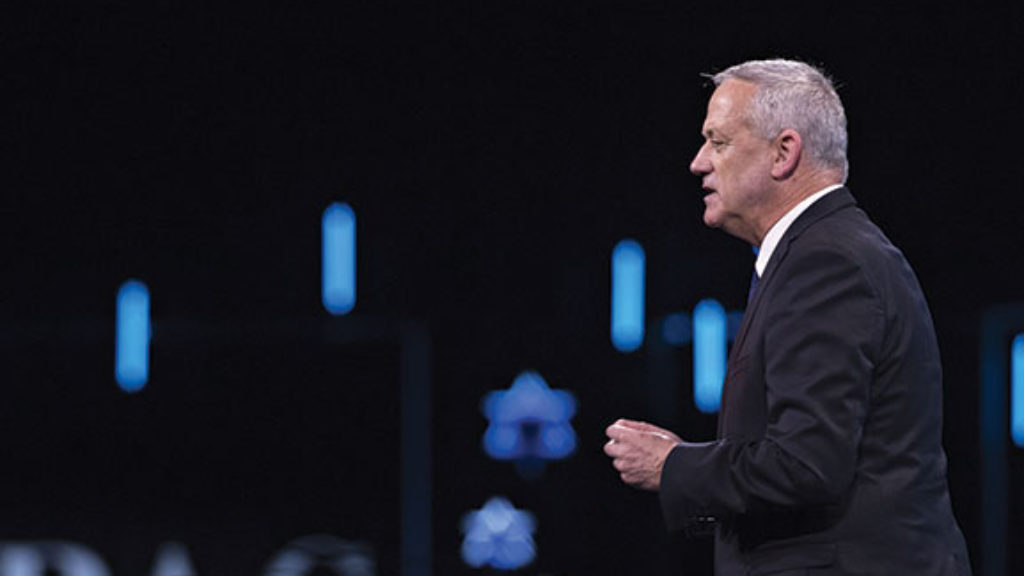
A Failure of Reimagination?
We once worried about the faith of young American Jews; now we worry about their politics. It’s part of a long historical development we should resist because Judaism-as-politics isn’t enough.
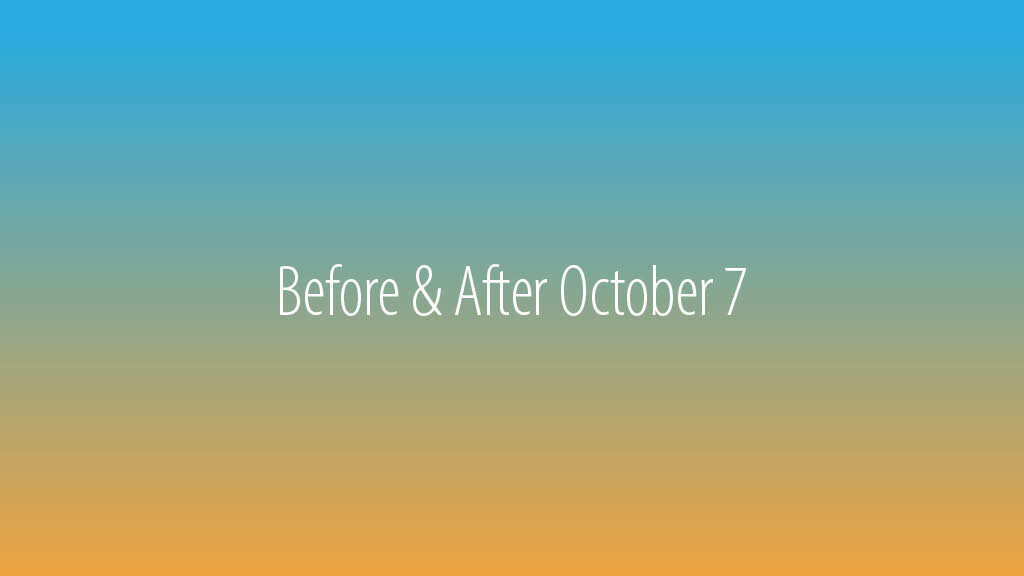
Before & After October 7: A Symposium
We asked distinguished friends and contributors a simple question: what did you believe before October 7 that you no longer believe?
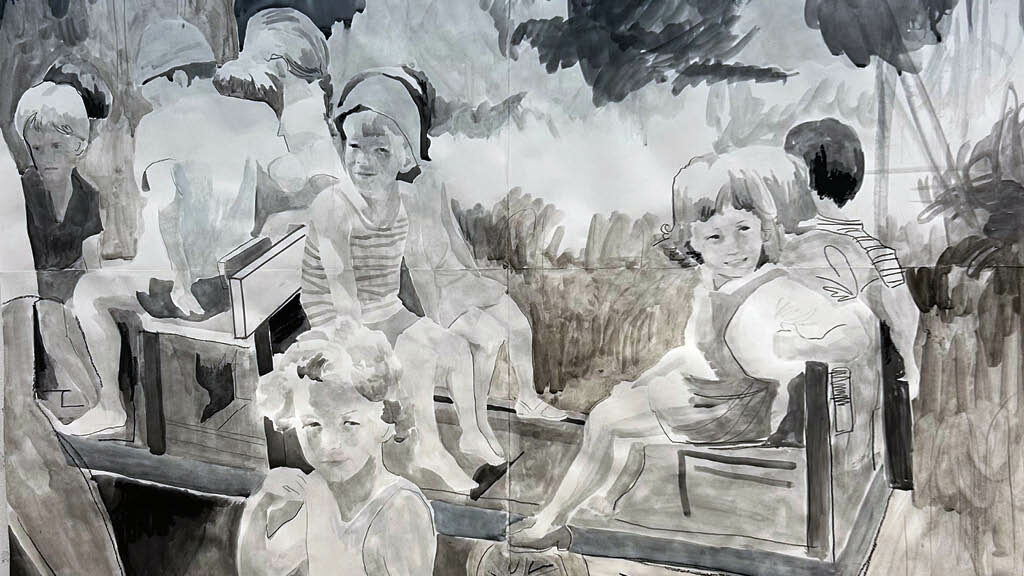
Of “Good Jews” and Bad Binaries
Anti-Israeli bigots do not hate Israel because they believe the worst about its actions. They feel an urge to believe the worst about Israeli actions because they hate Israel.
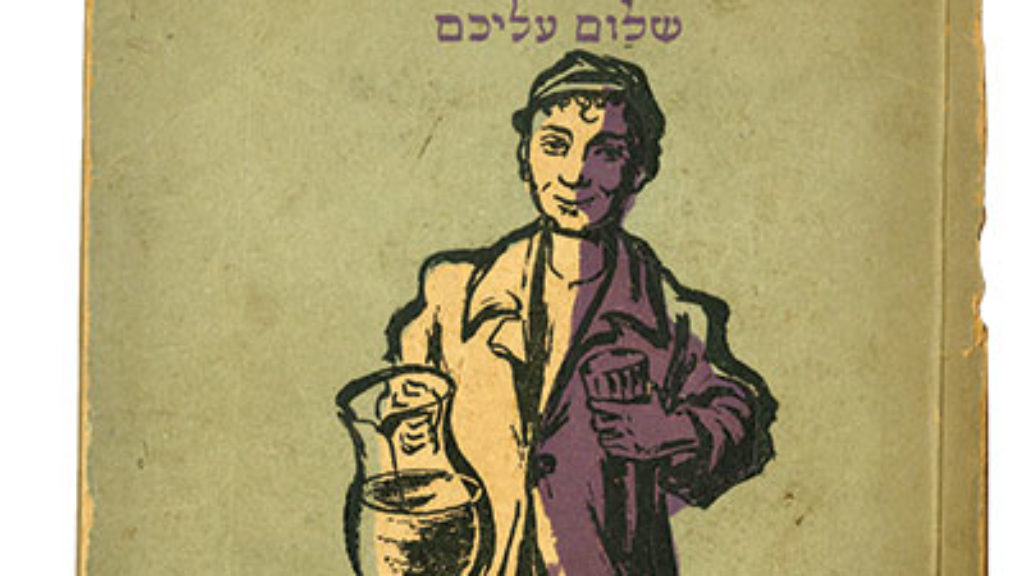
Learning Yiddish After 60
When I was about 10, I had a brilliant idea. If my parents would agree to speak only Yiddish with each other, it would just come to me without effort. I wouldn't have to learn it or study it, I would just wake up one day knowing it.
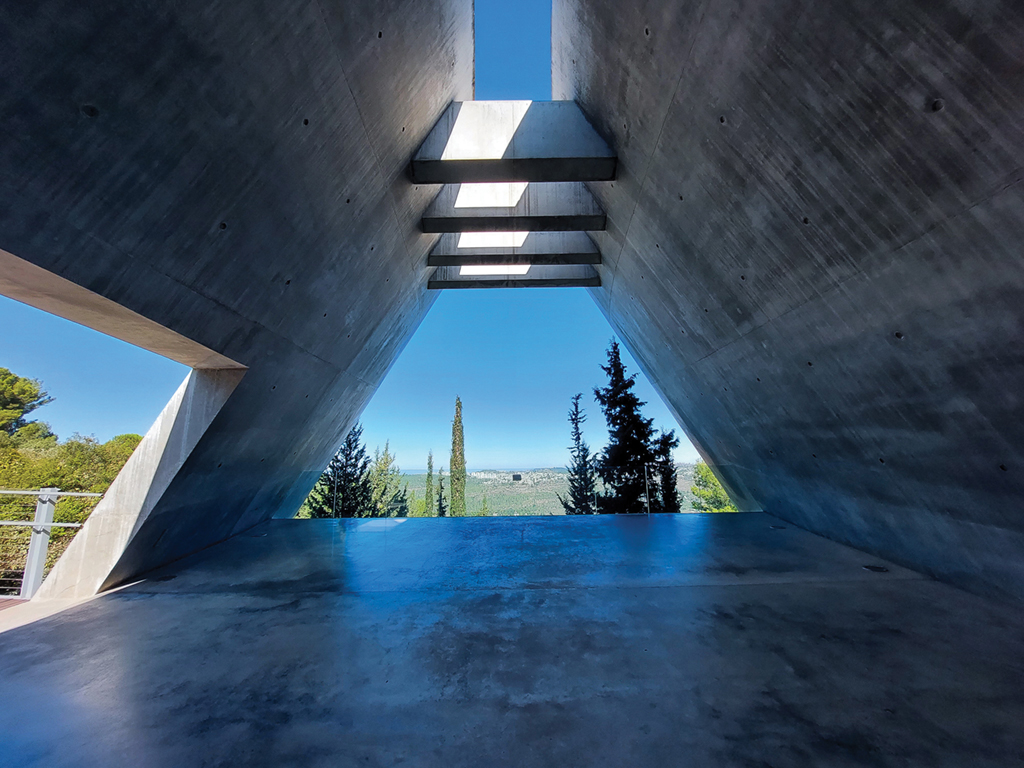
Sol Lax
Both the American and Israeli versions of the rebirth of Jewish history after being frozen in exile assumed a rupture with the religious mission that sustained Jewish life in exile. The secular theological crisis of Zionism is the question of what Israel's mission is if it is now the Jewish nation in exile among the nations. What is the goal if the negation of the exile doesn’t create normalization? In the West, we ask if there is something inevitable about rejection and anti-judaism.
Alan Carpien
I guess we do not need more Daniel Gordis’s - maybe more little grandma’s like Ruth Wisse- her comment on October 7, describes the Oslo agreement as the beginning of Israel’s potential demise that made October 7 possible. (She did not mention the Gilad Shalit trade.). Now she advocates the victory needed for Israel to convince the world that it is here to stay. Quotations from her views:
“. . .That the prime minister [Rabin] who had been elected to prevent that outcome should have outsourced part of Israel’s protection to its declared enemy may be the costliest unforced political move any country has ever made.”
….
“The rethinking that should have started thirty years ago has been forced on Israel with every new threat, culminating in the recent unspeakable attacks of October 7.”
…..
“ , I realize that Israelis are even more remarkable than one knew and are slowly convincing some of their neighbors that they are there to stay—also convincing them that coexistence has its benefits. With the liberalization of Saudi Arabia and perhaps, someday, Iran, the region will know some peace at last. My grief over what is happening in Israel is more acute now than it was after the investiture of Arafat, but Israel’s political realism makes me more confident of its future.”.
Alan Carpien
Looking for a response, I searched for Professor Ruth Wisse and found her views in the Winter 2024 edition of the JRB. Some excerpt below. I can have nothing to say to the shtetl Jews, who do not comprehend real evil!! Yes, only Ruth Wisse understands that this Hamas incursion was seeded by the Oslo agreement. Lumpen intellectuals - hey Stalin wasn’t so bad!
Ruth Wisse from a symposium on October 7 - before and after. This diminutive tough grandma never ceases to amaze me. The Oslo agreement as the beginning of Israel’s potential demise made October 7 possible. (She did not mention the Gilad Shalit trade.). Now she advocates the victory needed for Israel to convince the world that it is here to stay.
“. . .That the prime minister who had been elected to prevent that outcome should have outsourced part of Israel’s protection to its declared enemy may be the costliest unforced political move any country has ever made.”
….
“The rethinking that should have started thirty years ago has been forced on Israel with every new threat, culminating in the recent unspeakable attacks of October 7.” [*** my emphasis for this statement]
…..
“ , I realize that Israelis are even more remarkable than one knew and are slowly convincing some of their neighbors that they are there to stay—also convincing them that coexistence has its benefits. With the liberalization of Saudi Arabia and perhaps, someday, Iran, the region will know some peace at last. My grief over what is happening in Israel is more acute now than it was after the investiture of Arafat, but Israel’s political realism makes me more confident of its future.”.
Leon Hoffman
Professor Gordis's assessment of the bewilderment by both American and Israeli Jewry is profoundly on target. Hopefully it will remind us that fantasies of a utopian future prevent us from achieving the best adaptation possible. We often forget that trying for "perfection is always the enemy of the good."